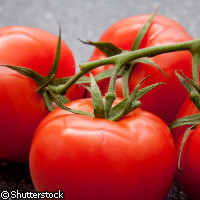Scientists reap bumper tomato harvest
EU-funded researchers have identified a mutation that can make tomatoes tastier and boost yields by up to 60%. The findings, published online in the journal Nature Genetics, could have exciting implications for the agricultural industry. The research, carried out by scientists in Israel and the US, received EU support via the EU-SOL ('High quality solanaceous crops for consumers, processors and producers by exploration of natural biodiversity') project, which is funded under the 'Food quality and safety' Thematic area of the Sixth Framework Programme (FP6) to the tune of EUR 18.7 million. The aim of this study was to investigate the phenomenon of hybrid vigour, also known as heterosis, which refers to the fact that the offspring of parents that are genetically different tend to be superior (i.e. taller or more productive for example) compared to offspring of genetically similar parents. Hybrid vigour was first observed by Charles Darwin, who published a weighty tome on the subject in 1876, and it has helped farmers produce many high-yielding crops such as corn and rice. Yet despite its obvious importance to agriculture, our understanding of why hybrids do better remains poor. One theory is that harmful mutations accumulate in inbred lines, but are hidden by crossbreeding. 'Another theory for heterosis, supported by our discovery, postulates that improved vigour stems from only a single gene - an effect called 'superdominance' or 'overdominance',' explained Dr Zach Lippman of the Cold Spring Harbor Laboratory (CSHL) in the US. The team turned to a giant library of 5,000 mutant tomato plants, each of which had a single mutation affecting different aspects of tomato growth, such as fruit size or leaf shape. They created hybrids by crossing each mutant with its healthy counterpart and looked for high-yielding offspring. Their efforts revealed one mutant which, when crossed with a non-mutant plant, resulted in a hybrid with extremely high yields. It turns out that the hybrid had one healthy copy and one mutated copy of a gene called Single Flower Truss (SFT), which is responsible for the production of a plant hormone called florigen. As its name suggests, florigen tells plants when to stop making leaves and start creating flowers, which in turn produce fruit. In healthy plants, flowering is controlled by a delicate balance between the levels of florigen (which promotes flowering) and another hormone that delays flowering. The star hybrid bred by the team had only one working copy of the florigen gene and this caused the plant to produce more flowers in less time. Furthermore, the gene triggered the same hybrid vigour effect in different varieties of tomato grown in various environments. 'It's the Goldilocks concept,' commented Dr Lippman. 'What we find is that to maximise yield, you can't have too much or too little florigen. A mutation in one copy of the gene results in the exact dose of florigen required to cause heterosis.' Interestingly, the florigen hybrids also turned out to produce sweeter, tastier tomatoes than the parent plants. This is surprising because increasing yields usually results in less tasty fruit. 'This discovery has potential to have a significant impact on both the billion-dollar tomato industry, as well as agricultural practices designed to get the most yield from other flowering crops,' said Dr Lippman. The team is now planning to study whether florigen genes in other crops have a similar effect. 'Mutant plants are usually thrown away because of the notion that mutations would have negative effects on growth,' Dr Lippman pointed out. 'Our results indicate that breeding with hybrid mutations could prove to be a powerful new way to increase yields, not only in tomatoes, but all crops.'
Countries
Israel, United States



